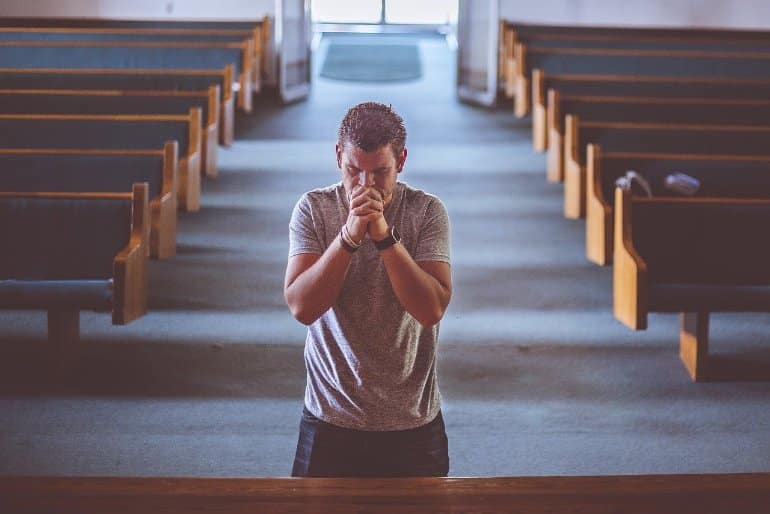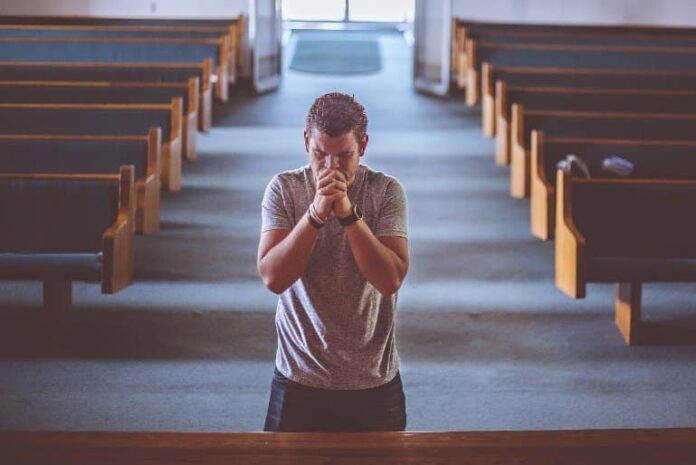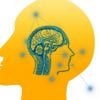[ad_1]
Summary: While attending religious services is generally associated with improvements in mental wellbeing, a new study reports spiritual experiences and belief in divine leading can lead to an increased risk of depression, especially in men.
Source: Westmont College
A national study examines the link between religious experiences and depression by following more than 12,000 American adolescents from their teens into middle adulthood. The research indicates that attending religious services staves off depression, but it also ties life-changing spiritual experiences and a belief in divine leading and angelic protection to an increased risk for depression, especially in men.
The study, “Religion/Spirituality and Gender-Differentiated Trajectories of Depressive Symptoms Age 13-34,” appears in the Journal of Religion and Health. It relies on data from the National Longitudinal Study of Adolescent to Adult Health drawn from respondents initially recruited during high school in 1994-95.
“Much of the research on religion and depression focuses on attending religious services and other commonly studied variables such as prayer or personal religiosity,” said study author Blake Victor Kent, Ph.D., assistant professor of sociology at Westmont College and research associate at Harvard Medical School and Massachusetts General Hospital. “Questions about spiritual experiences and belief in divine leading are rare in big epidemiological studies, so this is a great opportunity to add nuance to what we know about religion and mental health.”
In addition to asking about attending services, praying, and personal religiosity, the study explored if individuals anticipated divine interaction in their lives. Researchers sought responses to the following questions and statements:
- Did you ever have a religious or spiritual experience that changed your life?
- What seem to be coincidences in my life are not really coincidences; I am being “led” spiritually.
- Angels are present to help watch over me.
- Would you say you have been “born again” or have had a “born again” experience—that is, a turning point in your life when you committed your life to Jesus Christ?
Upon finding the association between these variables and increased risk for depression, the study proposes two different explanations. First, people who are more prone to depression may be more likely to have spiritual experiences and seek divine leading and protection because they use their spiritual resources to counteract poor mental health.

“But what if the religious environment or beliefs themselves are the source of depressive symptoms?” Kent asked. He defines “experience-driven religious environments” as churches and religious communities that expect and normalize divine interaction. “Those who struggle to establish an emotional connection to God may be constantly disappointed even though they work hard to hear from God and feel led by God. They may wonder whether God has abandoned them and why they’re not experiencing God the way everyone else seems to.”
Statistically, women suffer more from depressive disorders than men. But the study finds the link between depression and religious experience and divine leading stronger in men than in women.
“We already know that women in the U.S. are more religious than men and that they tend to be more relational in their approach to God,” Kent said.
“That’s pretty well established. Men try to go it alone a little bit more. This study suggests that when they have a spiritual awakening or look for divine help, it may because they went a little further into the dark, or that God feels a little less responsive.”
About this religion and depression research news
Source: Westmont College
Contact: Press Office – Westmont College
Image: The image is in the public domain
Original Research: Closed access.
“Religion/Spirituality and Gender-Differentiated Trajectories of Depressive Symptoms Age 13–34” by Blake Victor Kent. Journal of Religion and Health
Abstract
Religion/Spirituality and Gender-Differentiated Trajectories of Depressive Symptoms Age 13–34
Studies examining religion/spirituality (R/S) and depressive symptoms report divergent findings, often depending on the types of variables considered. This study assessed whether subjective and experiential R/S variables were associated with increased depressive symptom burden from adolescence to young adulthood. Variations by gender were also assessed. Using group-based trajectory modeling with a cohort-sequential design, four distinct symptom trajectories were identified for women and five for men. 27.4% of women and 10.2% of men were classified on peak trajectory groups. Religious attendance was protective for men and women. Prayer was protective for women but linked to risk for men. Born-again and life-changing spiritual experiences, along with belief in supernatural leading and angelic protection, were broadly associated with increased classification on elevated symptom trajectories. In one exception, belief in supernatural leading was associated among some men with decreased risk of depressive symptoms during adolescence. Researchers must take a variety of R/S variables into account when assessing depressive symptoms, not simply religious attendance, prayer frequency, or affiliation as is commonly practiced. Religion and spirituality are multidimensional and in some cases may operate differently for men than women vis-à-vis mental well-being.
[ad_2]
Source link













